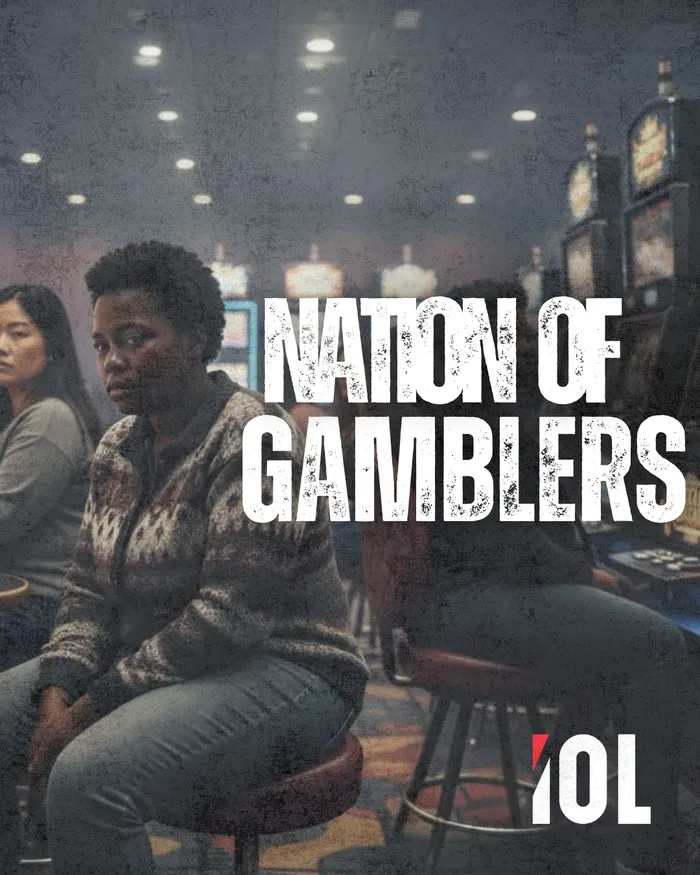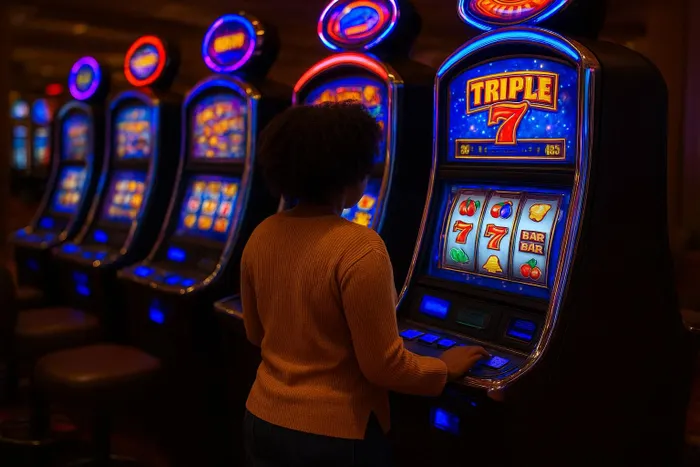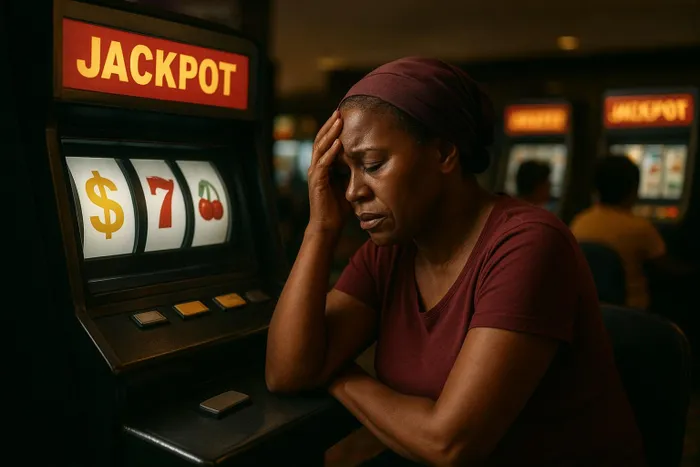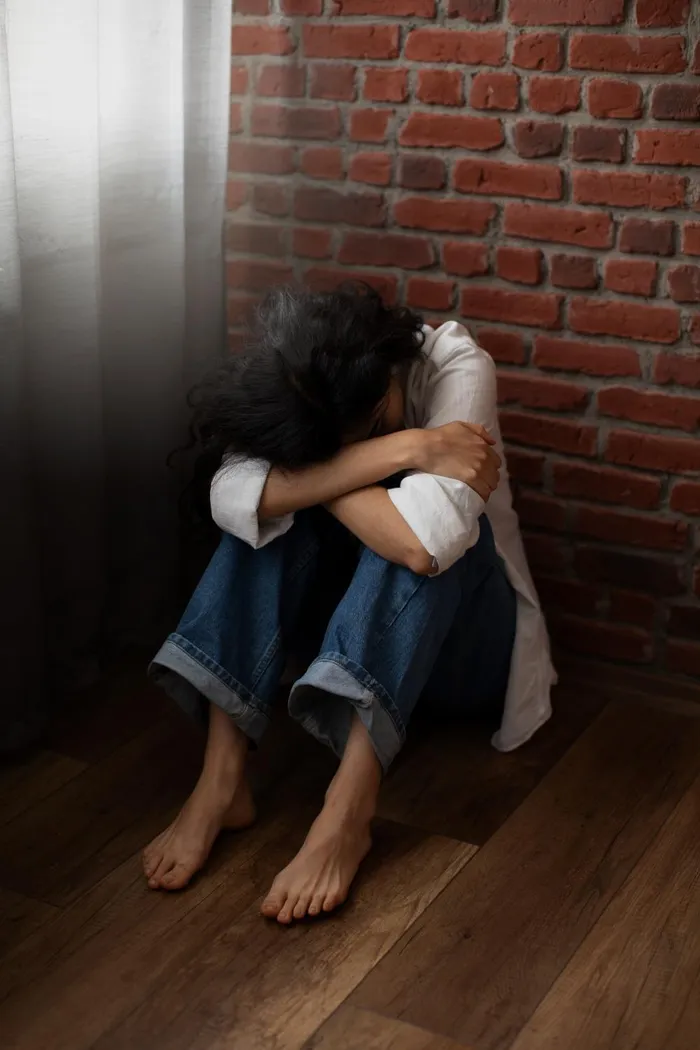The hidden struggles of South African women with gambling addiction

What starts as harmless relaxation can slowly shift into an unhealthy obsession, mimicking the same escapism that drives people to drink or use drugs.
Image: Gerry Cupido / Gemini AI
It’s 10am on a Wednesday when I decide to step into the local casino to find out what all the hype around gambling is about.
As I walk in, a woman wearing a peak cap, head down and eyes fixed on the floor, brushes past me, clutching her handbag tightly.
My first thought is, “Is she leaving already?”
The faint smell of cigarette smoke mixes with the sound of upbeat music and the chiming of machines. What surprises me most is the number of women already seated at the slot machines.
Their eyes are glued to the flashing lights in front of them, faces completely blank.
With R50 in my pocket, I wander around the casino floor, overwhelmed by the endless rows of machines flashing JACKPOT! alongside pictures of parrots, cherries, and other bright symbols.
Feeling lost, I stop a staff member for help.
“Is this your first time?” she asks. When I tell her it is, she smiles and says, “This is your lucky day. There’s always beginner’s luck.”
Eventually, I pick a machine that looks fun and place my first bet.
A burst of bells rings out, and my credits shoot up. Excited, I press the button again, hoping for another win.
It doesn’t come.
Within minutes, my R50 is gone. I stare at the silent machine, thinking, “That was a waste of money.” I walk out with my head down, eyes fixed on the ground, just like the woman I’d seen earlier.
My brief encounter with the slots left me disappointed, but it gave me a glimpse into a world that has lured and destroyed the lives of countless women.

I left the casino disappointed.
Image: Gerry Cupido / Gemini
A growing problem in South Africa
Gambling has become a growing concern in South Africa, spreading beyond traditional casinos to online platforms and mobile apps.
This shift has created new challenges, particularly for women who face financial pressure, social expectations, and emotional struggles.
A study published in Frontiers in Psychology notes: “Female gamblers are branded as negligent, vicious, and bad mothers during the gambling spiral, generating feelings of guilt.”
This stigma often deepens the emotional burden for women already battling addiction.
In recent years, gambling among South African women has risen sharply. Many turn to it to supplement income or as a coping mechanism for financial stress.
A report by the National Gambling Board (NGB) found that gambling has become increasingly normalised, with fewer people expressing moral concerns about it.
Yet, the same report warns that current regulations must evolve to address the rise of online and mobile gambling.
“That’s how you get hooked”
Behind the statistics are real stories of women whose lives have been deeply affected.
One such story is that of a 63-year-old woman from Cape Town whose gambling journey began unexpectedly at 38.
“A friend of mine said to me, ‘Come, just see what’s happening here,’ and so I went and played,” she recalls.
Her first experience was thrilling. She won a jackpot on her very first visit, turning R100 into R1,000.
This early success was the hook. On her next two visits, she won R2,000 and R2,500.
“That’s how you get hooked,” she explains. “By winning the jackpot at the beginning.”
That initial luck convinced her she could always win. Even as the losses started piling up, she told herself, “Well, I won the other day. I’ll win again.”
Her biggest single win, R40,000, came at a larger casino with more machines. But she soon realised it wasn’t truly a win.
“When you win R40,000, how much money have you already spent on the days you didn’t win anything?” she asks.
She noticed that many women, particularly those who were divorced or lonely, filled the casino seats.
“I found comfort in the machines,” she admits. “I was lonely, I was divorced. I used to go to the casino a lot.”
But the comfort came at a heavy price. The stress of losing even R1,000 became unbearable. “It’s not relaxing anymore. Then you stress,” she says.
Eventually, she quit after realising the toll it had taken. Her advice to other women is simple and heartfelt: “It’s not worth it. Stress gives you high blood pressure, and it makes you sick. That’s why I stopped. My advice is just don’t start. Please, ladies, it’s not worth it. You never, ever get your money back.”
“This machine keeps chowing my money”
In one of KwaZulu-Natal’s largest casinos, a woman in her late 60s sat frowning at a slot machine when she was approached by IOL.
Dressed in typical gogo fashion, she seemed unassuming, but by 12:30pm, she had already lost R3,000. By 2pm, her total losses had climbed to over R5,000.
“I am so angry. I keep playing and hoping that I’ll win, but I haven’t yet,” she said. “I arrived with R3,000 this morning and thought it would be enough, but this machine keeps chowing my money.”
Despite her losses, she flipped her chair to mark her spot and soon returned with another R2,000.
“I will win this time,” she declared. Yet again, the machine chimed with another loss.

The money won will never make up for all the losses.
Image: Gerry Cupido / ChatGPT
Why women gamble
Louise Swart, a recovery coach at Cape Addiction Recovery Specialists, says gambling addiction among women is far more complex than simply chasing money.
“Gambling addiction is part of a process addiction,” she explains, comparing it to non-substance dependencies such as pornography or compulsive behaviours.
She says one of the biggest misconceptions is that women are less likely to develop gambling problems.
“That’s the furthest from the truth,” she asserts.
According to Swart, many women’s addictions stem from trauma or loneliness. Gambling becomes a form of escape, a way to fill a deep emotional void.
Even casual mobile games can act as a gateway.
“Candy Crush has opened up this whole avenue to gambling addiction for people, and they don’t even know it,” she warns.
What starts as harmless relaxation can slowly shift into an unhealthy obsession, mimicking the same escapism that drives people to drink or use drugs.

For these women, gambling isn’t about money; it’s about belonging and self-worth.
Image: Freepik
Swart says many of the women she counsels describe a similar pattern: “The ladies I deal with often have a typical void. It’s a trauma that hasn’t been dealt with.”
For these women, gambling isn’t about money; it’s about belonging and self-worth.
“For that split second, there’s worth. It’s like, ‘I’ve done something, I’ve achieved something.’ It’s this false sense of belonging.”
The machine becomes their “best friend,” Swart says. “It doesn’t judge them. It doesn’t tell them they’re lonely. It doesn’t tell them they have a problem.”
But the outcome is always the same. “You never make your money back. You just never do.”
She recalls one woman who finally won a large sum after years of gambling, only for her husband to say, “Finally, you made back all the money you’ve wasted.”
That comment captures the cruel illusion of control that keeps people trapped, always chasing that next win, hoping that something will finally go right.
“They wouldn’t do it if they didn’t win once,” Swart says. “That first win creates an illusion of control, but it’s never real.”
The addiction, she explains, can change form. If someone can’t access money, they’ll find another outlet, from casino slots to mobile games. “It never stops, it never levels out, it always goes deeper.”
Swart adds that the brain of a gambling addict and that of a heroin addict show remarkably similar patterns of damage.
“Women now make up between 30 and 50 per cent of people seeking treatment for gambling problems,” she says, adding that many cases remain hidden because of shame or cultural silence.
The high cost of the win
What begins as harmless fun, a little excitement or distraction, can spiral into a painful and isolating addiction.
For many women, gambling isn’t really about money. It’s about coping with loneliness, trauma, or the need to feel in control.
But as countless stories show, the house always wins, and the cost is far greater than the cash lost.
For help to quit gambling, call the The South African Responsible Gambling Foundation on its toll free counselling line, 0800 006 008 Or WhatsApp/SMS HELP To 076 675 0710 or email to helpline@responsiblegambling.org.za
Related Topics: